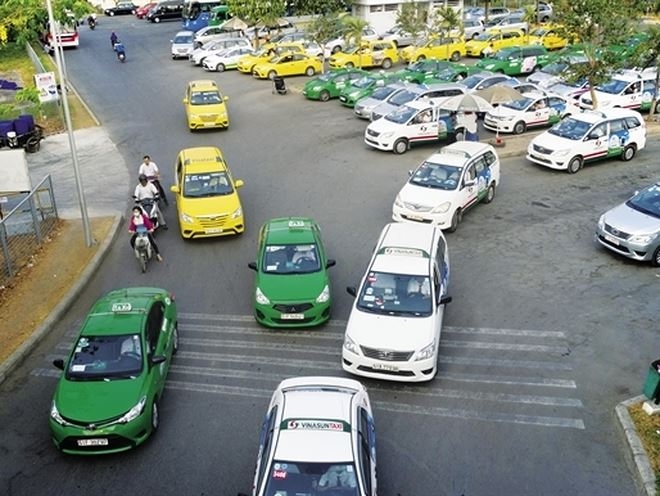Putting ride-hailing and taxi firms under same hat could blunt growth
 |
| Putting ride-hailing platforms and transport companies into the same category would be a great step back |
There has been heated debate about the sharing economy, especially in the field of transportation. Keeping an open-mind on sharing economy and ride-hailing platforms, several experts stated that the nature of technology platforms is in line with the regulations stipulated in Decree 52. Although the decree has yet to catch up to the fast-developing digital economy, there are still some relevant regulations.
In addition, the state is collecting comments on the draft decree to amend and supplement Decree No.86/2014/ND-CP on business and conditions for transportation business. Based on some of the comments, the tasks of the Ministry of Industry and Trade would be assigned to Ministry of Transport (MoT) if technology platforms are treated as transportation services.
According to Lai Viet Anh, deputy director general of e-commerce and the digital economy department under the Ministry of Industry and Trade, technology platform providers must comply with the regulations stipulated by Decree 52. The decree has a whole chapter on digital service providers, including online auction, online trading, and online promotion floors. Decree 52 clearly defines the rights and obligations of digital platform operators as well as units selling goods and providing services on the platforms.
She added, “The question is: should we impose the existing legal framework on new business models? Should we request all economic entities to abide by the existing regulations or ease the regulations for new business models to allow them to participate in the market and contribute to economic development?”
Economic expert Ngo Tri Long shared his thoughts about the lingering debate over the draft decree to replace Decree No.86/2014/ND-CP. He pointed out that treating technology platforms as transportation service providers would adversely impact tech companies and passengers, which is a step back in the Industry 4.0 era.
Indeed, technology platforms boast numerous advantages, including big data processing systems and connected artificial intelligence to match customers with the closest vehicles as well as efficiently calculating fares for the trip.
By classifying technology-based service providers and transportation companies under the management of the MoT, it would eliminate specialisation and adversely affect the development of technology platforms. It is not fair to ask tech companies to comply with regulations specifically tailored for transportation companies.
“The regulations will not only distort the nature of the platform but also undermine the overall benefits of technology,” Long stated.
The application of technology to revitalise transportation has become a trend around the world. However, the debate over electronic contract-based vehicles and the amendment of Decree 86 continue to linger in Vietnam. Obviously, it would lead to overlapping enforcement mandates if tech companies, digital platforms, and transport service companies were put in the same category.
In addition, some of the regulations would overlap in areas where digital service providers collaborate with transportation companies. In this case, two different entities would bear similar responsibilitieswhen carrying passengers.
Commenting on this issue, Ngo Vinh Bach Duong, head of the economic law department under the Institute of State and Law, said that it would be unreasonable to define a ride-hailing firm as a provider of transportation services because their main product is technology. The Court of Justice of the European Union ruled that Uber provides ‘a service in the field of transport’ without classifying it as a taxi company.
It is obvious that companies do not cover all parts of the supply chain. They can choose one or several segments to invest in. In a bid to manage technology platforms, the government should focus on transaction conditions to assign responsibilities appropriately as well as protect the rights of consumers and partners in the transaction.
“It would be inequitable to require technology platforms to comply with the regulations of transportation companies. It would be even more irrational to request digital companies to invest in a fleet of vehicles, fire prevention solutions, as well as provide driver training,” he said.
What the stars mean:
★ Poor ★ ★ Promising ★★★ Good ★★★★ Very good ★★★★★ Exceptional
 Tag:
Tag:
Related Contents
Latest News
More News
- The generics industry: unlocking new growth drivers (February 04, 2026 | 17:39)
- Vietnam ready to increase purchases of US goods (February 04, 2026 | 15:55)
- Steel industry faces challenges in 2026 (February 03, 2026 | 17:20)
- State corporations poised to drive 2026 growth (February 03, 2026 | 13:58)
- Why high-tech talent will define Vietnam’s growth (February 02, 2026 | 10:47)
- FMCG resilience amid varying storms (February 02, 2026 | 10:00)
- Customs reforms strengthen business confidence, support trade growth (February 01, 2026 | 08:20)
- Vietnam and US to launch sixth trade negotiation round (January 30, 2026 | 15:19)
- Digital publishing emerges as key growth driver in Vietnam (January 30, 2026 | 10:59)
- EVN signs key contract for Tri An hydropower expansion (January 30, 2026 | 10:57)





















 Mobile Version
Mobile Version